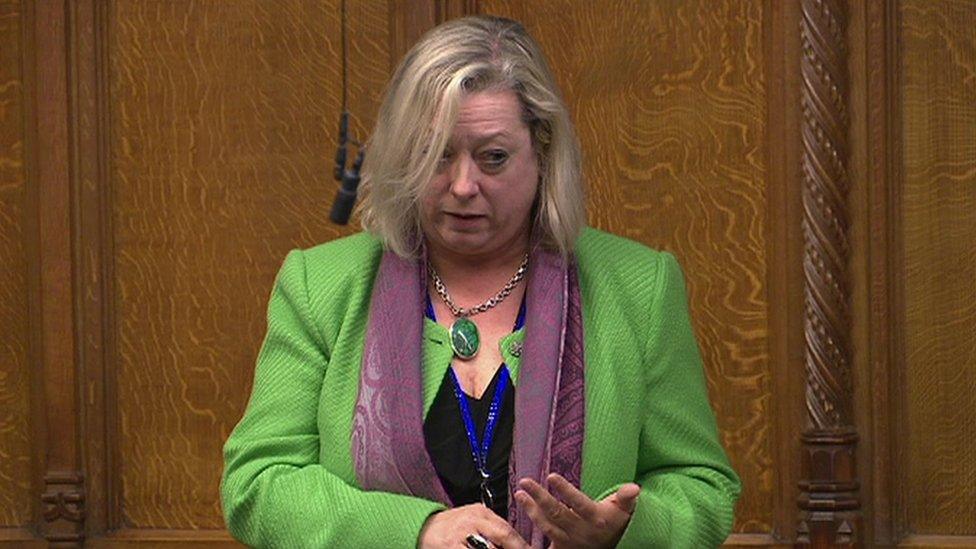Chris Pincher: Tory MPs ask how long ministers can tolerate government lies
- Published
Opposition MPs heckle and laugh as the paymaster general says Boris Johnson "acted with probity at all times"
Senior Conservative MPs have asked ministers how long they can continue to tolerate government dishonesty after the Chris Pincher row.
Boris Johnson's former anti-corruption tsar John Penrose suggested it was time to say "enough is enough".
And select committee chairman William Wragg urged ministers with a "sense of decency" to resign.
Mr Pincher has been suspended as a Conservative MP over allegations of sexual misconduct.
The Tamworth MP says he is seeking professional medical support and has denied misconduct. He has been contacted by the BBC for comment.
A government source has told the BBC morale in government is "low", and the mood in cabinet is "changing".
Mr Johnson promoted Mr Pincher to deputy chief whip in February this year, despite being told about formal complaints about his behaviour, it has emerged.
Downing Street had previously claimed Mr Johnson had not been aware of any "specific allegations".
But on Monday, BBC News revealed the prime minister had been aware of a formal complaint about the MP's behaviour, and in a letter to the Parliamentary Standards Commissioner, former top civil servant at the Foreign Office, Simon McDonald said Mr Johnson had been briefed "in person" about the allegations in 2019.
Cabinet Office Minister Michael Ellis told MPs the prime minister could not "immediately recall" the 2019 conversation when fresh allegations about Mr Pincher emerged last week.
"As soon as he was reminded, the No 10 press office corrected their public lines," he said.
He accused Labour critics of the government of being "sanctimonious" and more interested in "personalities" than issues that mattered to the public.
Veteran Conservative MP Peter Bone said many opposition MPs only turn up to the Commons to "bash Boris".


"Embarrassing" is how a normally supportive MP summed up Boris Johnson's handling of the Chris Pincher allegations.
Their loyalty is being tested, they say, by the way Downing Street's position has shifted repeatedly and they believe the whole affair is "eroding trust" in politics.
Number 10, the MP told me, are a "walking, talking advert" for rebels to get elected to the backbench 1922 committee in an attempt to orchestrate a leadership challenge. They said the PM had a 50/50 chance of surviving until the end of the year.
Many backbenchers are openly critical of Mr Johnson now but more still are wavering, their loyalty is being tested and they're asking themselves how much they are willing to defend.
One minister who is very close to Mr Johnson expressed sympathy for colleagues who have to repeat a line from Number 10 only to have "their legs kicked out from under them".
The minister said rigorous testing of statements to be given in public was "not happening".

On Tuesday afternoon, the prime minister spent time in the Commons tea room, talking to MPs in an effort to shore up support among MPs.
Simon Hoare, another critic of Mr Johnson, rejected the move, tweeting: "Been there. Done that. Purchased the T-shirt. 'I'm sorry. I will listen. I will learn' then joke behind closed doors 'I don't see any problem etc'. It won't wash any more. That tactical ship has sailed (and sunk)".
In the Commons earlier, Labour deputy leader Angela Rayner said the latest disclosures about the Pincher row revealed an "ethical vacuum" at the heart of Downing Street.
And senior Tories, including some who tried to topple Mr Johnson in a confidence vote last month, joined in with opposition criticism.
Mr Penrose, who last month resigned as the PM's anti-corruption adviser, accused Number 10 of flouting the Nolan principles of public life, external, which include "honesty".
"How many more of the seven principles are they going to have to breach before he will stand up and say 'enough is enough'?" he asked Mr Ellis.

Jackie Doyle-Price calls for a "complete reset" of ministerial standards
Mr Wragg urged ministers to "consider what they are being asked to say in public which changes seemingly by the hour" and for those with a "sense of decency" to "consider their positions".
Former government whip Jackie Doyle-Price told MPs: "The very whiff of rumours and historic incidents that Simon McDonald referred to in his letter should have been enough to tell the prime minister that that appointment wasn't wise, and he could have made use of the honourable gentleman's talents in a different department, as he had done previously."
Calling for a "complete reset" of ministerial standards, she said: "I think we are now on a half a dozen different variations of degrees of honesty with which the knowledge of these events has been addressed by Number 10."
Watch: Peers laugh over standards in public life statement
Sir Bernard Jenkin, chairman of the powerful Liaison Committee, demanded to know why those with "the wrong attitudes and the wrong behaviours" are promoted by their leaders.
Another backbencher, Caroline Johnson, who is a supporter of the PM, asked Mr Ellis why Mr Pincher was not sacked in 2019, if the allegations brought against him were "similar" to those made about "bad behaviour" at the Carlton Club, over which he has now been suspended.
Mr Ellis said he was unable "to speak to that", adding: "We must do everything we can to protect the confidentiality of those who make complaints. I'm very concerned that the way in which this matter has been processed by some individuals means that it opens up a risk of a breach of confidentiality."
There are "two schools of thought" in Downing Street over how to handle the Pincher row, a government source told the BBC. One was to "batten down the hatches" and one was that "we need to be more open" about everything that was known.